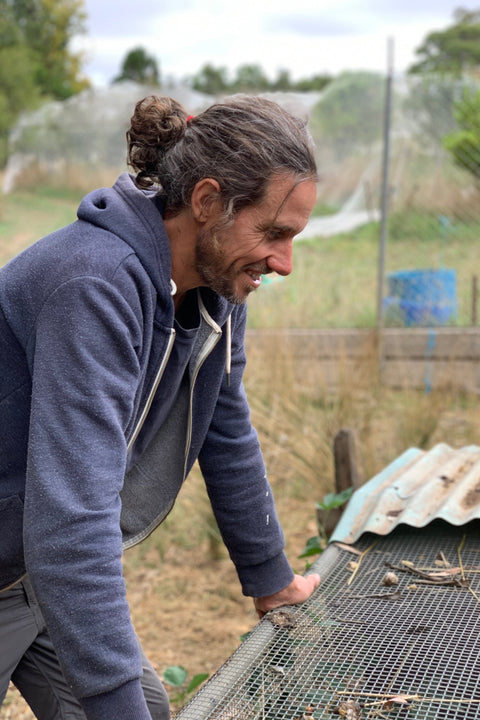
Jauma
People: James Erskine
Place: McLaren Vale, Australia
Grapes: Sauvignon Blanc, Chenin Blanc, Arneis, Syrah, Grenache, Cabernet Franc
Farming: Certified Organic, Biodynamic
Production: 39.000 bottles
Before jumping the fence, James Erskine had carved out a formidable career as a sommelier, one that took him all across the world. While at the peak of his career, he formed an experimental wine group called The Natural Selection, with Sam Hughes, Anton von Klopper and Tom Shobbrook. Jauma produced its first wines in 2010 from McLaren Vale Grenache fruit. Erskine’s philosophy is very much down a natural line, with manipulation and additions shunned.
James Erskine
“My journey into the world of wine and gastronomy began during my training as a chef. Understanding wine is essential in the culinary world, although I was not particularly a big drinker at the time. My interest in gastronomy led me to become a sommelier. I moved to Berlin and worked in Austria, notably in regions like Burgenland and Wachau. It was during my time in Europe that I developed a keen interest in vinegars as well, which inadvertently sparked my fascination with wine.”
Upon returning to Australia, James pursued an Honours Degree in Agricultural Science, specialising in Oenology, while working in various renowned venues in Adelaide. However, his thirst for knowledge didn’t stop there. He enrolled at UC Davis, a decision that led him to make frequent visits to Napa Valley and other prominent wine regions. His journey also included a harvest in South Africa.
"Back in Adelaide, my dedication to wine was recognised through numerous accolades. I received the Sommelier of the Year award and topped the class at the Court of Master Sommeliers exams in Melbourne in 2008. Furthermore, I was honoured with the Negociants Working with Wine Fellowship and became a Len Evans Scholar. My career also took a significant turn when I became the head sommelier at Penfolds' restaurant in Adelaide. With all this, I still didn’t realise which level I’m on. I met up with Anton (Lucy Margaux) and Charlotte Dalton and started doing some simple wines with no additives.”
Back in the day, natural wine was a concept many winemakers hesitated to explore, with the exception of Anton van Klopper. In 2009, Tom Shobbrook, Anton, and James embarked on an innovative project: crafting keg wine without any preservatives."Anton claimed that kegs weren’t sexy, leading us to switch to demijohns - these large, 23-litre glass jars fitted with a tap. This approach really caught on; we sold hundreds of these jars, often right from the back of a truck. Everything was like a punk movement, giving us a sense of freedom to experiment and push boundaries as we pleased.”
Working as a sommelier, James noticed that the wines he was serving were too robust for food offered. Given their proximity to the ocean, there was a need for wines that were juicier, fresher, and cleaner. That inspired James to start producing his own wines. 
The Wines
"My approach was straightforward: no acidification, no sulfites, no fining, and no filtering – just pure juice. After making our first batch of wines, Andrew Gard and Dan Clark were among the first in the industry to hop on the natural wine train. They recognised that our wines weren't made for the suited up, grey-haired men. This led to the birth of the Natural Selection Theory. Embracing a 'simple is best' philosophy, Natural Selection Theory became a cornerstone for a new era in Australian wine culture – one that valued open-mindedness, creativity, environmental responsibility, and a touch of irreverence.”
Australia's wine market is distinct from the rest of the world. Until the 1990s, Australians had a preference towards beer and sherry. It was in the early 2000s that the wine movement exploded and the approach to farming started shifting into a new direction."Here, the typical practice involves landowners growing grapes with guidance from consultants on farming techniques. The winemakers then purchase these grapes - it’s still a very broken system. After South Australia, the emergence of boutique wineries in regions like Yarra Valley, led by pioneers such as Luke Lambert and Mac Forbes, marked a significant shift. I founded Jauma in 2007, a time when there was ample availability of grape growers. However, as exports increased, securing growers became increasingly challenging. While profitability is important, we also prioritize ensuring fair compensation for both the growers and our employees.”
Natural wines emerged as a response to the increasing use of chemicals in both farming and conventional winemaking. In contrast, the philosophy behind natural wine is about embracing and working with the inherent qualities of what one has. It's about appreciating the wine in its raw, authentic form rather than enhancing it to the point where its unique character and individuality are lost.Jauma’s wines range from the deeply profound to effortlessly smooth, showcasing a remarkable balance that reflects both experience and youthful innovation. James’ talent for blending lightness with depth is something we really admire. We are thrilled to have the opportunity to carry these wines in Singapore, without a single doubt in our minds."Today, the Australian wine scene sees a coexistence of low-intervention and conventional wines. The division still exists, but the earlier struggles have mellowed. I think of as the music scene - everyone has the freedom to enjoy what they like without causing harm or offence to others.”
[Originally published in February 2024]
Aleksandar Draganic